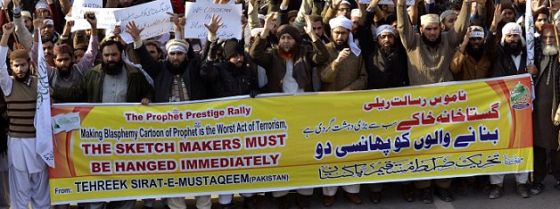If the text on the banner above had been faked by someone using Photoshop, one might imagine that this was some kind of Islamophobic satire. But it is not. These are Muslims who unwittingly satirize themselves. Nothing that can be said about them is more damning than what they say themselves.
I am not a Muslim, nor a scholar of Islam and thus have no competence to engage in a critique of Islamic doctrine. So when I talk about criticizing Islam, I’m not implying that I think it is doctrinally defective.
Islam, in my view, is just like any other religion, in the sense that it is an amorphous, complex entity, expressed collectively through the lives of everyone who calls themselves a Muslim. Islam equals 1.8 billion Muslims, almost a quarter of the world’s population, including as much diversity as the non-Muslim world.
Arguments about “good” Muslims and “bad” Muslims, authentic Islam and distorted Islam, radical Islam and moderate Islam, generally involve questions about how Muslims want to represent themselves or how they are represented by others. Like all representations, these have the tendency of projecting uniformity by masking complexity.
In the polarized atmosphere following 9/11 and once again following the Charle Hebdo attacks, at one extreme are those who say that the attacks reveal the true nature of Islam and at the other those who say the attacks and attackers have nothing to do with Islam. Each camp sees the other as promoting a lie.
Among those in the West who see anti-Muslim rhetoric escalating to a dangerous degree, the standard response has been to attribute this to an underlying racism and Islamophobia — both of which are of course clearly in evidence in Europe and North America — but the problem in making this analysis is that it tends to gloss over some glaringly obvious and disturbing facts.
The French gunmen chose as their target, individuals whose only “crime” was that they had insulted the Prophet Muhammad, and having accomplished their goal, loudly declared “We have avenged the Prophet Muhammad.” Even if they were alone in thinking this, it seems undeniable that in their own minds they believed that they were acting in defense of Islam.
But they were not alone. At a small demonstration in Peshawar, Pakistan, this week, protesters chanted “Long live Cherif Kouachi, long live Said Kouachi.” They branded the cartoonists, not the gunmen, as the terrorists. They marched behind a placard which said: “A strong message was needed and they [the Kouachis] delivered it. We salute the messengers. May they live long.”
Expressions of support for the attacks can be found in abundance online.
Today there are again protests across Pakistan against the cartoons in the latest issue of Charlie Hebdo.
But the Lebanese journalist, Nadim Koteich, points out bluntly what should be obvious to Muslims and non-Muslims alike:
“Nothing insults Islam more than the Charlie Hebdo massacre.”
In a similar vein, Nervana Mahmoud laments: “We are more offended by cartoons than butcheries, crucifixion, slavery, flogging. That how twisted is our mindset!”
Meanwhile, Raif Badawi, a blogger in Saudi Arabia has received 50 lashes — the first installment in a sentence of 1,000 lashes — for “insulting Islam.”
Badawi’s “crime” is that he has expressed ideas like this: “States which are based on religion confine their people in the circle of faith and fear.”
While the Paris attacks were widely condemned in Saudi Arabia, the Saudi rulers have been criticized for not condemning the cartoons and so the Badawi case serves as a way they can boost their religious credibility.
“They’re under pressure inside to punish people like him, especially among Salafis. It is a question of the legitimacy of the state. You have to remember those people are very influential at a street level,” Mustafa Alani, an Iraqi security expert with close ties to the Saudi Interior Ministry, told Reuters.
In the West, the popular and visceral response to the Paris attacks was they represented a dire threat to free speech and thus free speech must be vigorously defended.
This then provoked a smaller but fairly vocal “yes, but…” reaction which focused on the need to oppose Islamophobia and to acknowledge that the cartoonists had been unnecessarily provocative.
One of the many problems with this backlash is that it prompts an eminently reasonable question: If now is not the time to be speaking in defense of free speech, when would such a need arise?
Slavoj Žižek refers to “the pathological fear of many Western liberal Leftists to be guilty of Islamophobia,” and I agree that such a fear exists.
Indeed, I would say that the only way a non-Muslim can genuinely show solidarity with Muslims right now is, paradoxically, by taking the risk of appearing Islamophobic.
Rather than treat Islam and Muslims like a delicate fruit which will bruise unless handled with the greatest care, it might actually be a sign of greater respect to assume that this religious tradition and its living representatives have enough resilience to withstand criticism from both the inside and the outside.
(And I’d apply the same argument to Jews and any other group that have a tendency of hiding behind their own sense of victimization.)


